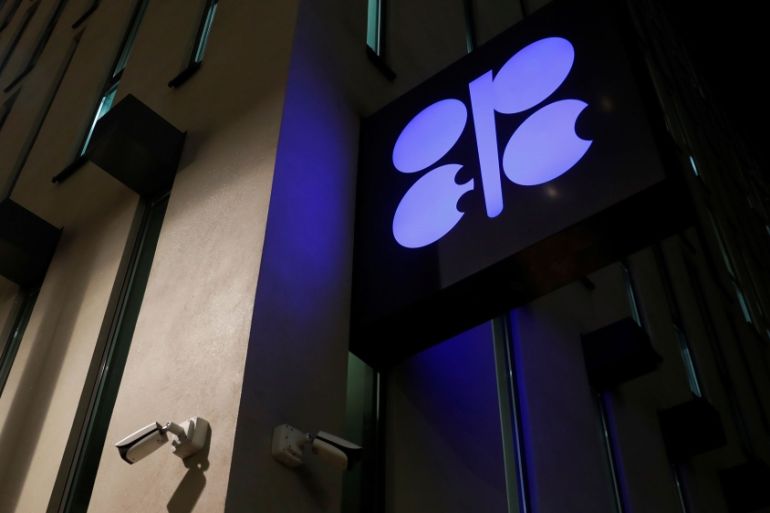OPEC members expected to agree to oil production cut
Despite calls from US President Donald Trump to keep oil flowing, major producers are expected to agree to cut output.

The Organisation of the Petroleum Exporting Countries (OPEC) is expected to agree to cut oil production at a meeting aimed at supporting oil prices.
Representatives from some of the world’s top oil producers are due to meet on Thursday in Vienna, following a recent decline in the price of the commodity.
Keep reading
list of 4 itemsOPEC+ agrees voluntary oil production cuts
Will food prices get higher?
Iraq approves record $153bn budget aimed at creating jobs
Hours before the meeting, US President Donald Trump called on OPEC and its allies to keep oil production high, so that prices remained low for the foreseeable future.
“Hopefully OPEC will be keeping oil flows as is, not restricted. The World does not want to see, or need, higher oil prices!” said Trump, who has in the past repeatedly accused the cartel of keeping prices artificially high.
Hopefully OPEC will be keeping oil flows as is, not restricted. The World does not want to see, or need, higher oil prices!
— Donald J. Trump (@realDonaldTrump) December 5, 2018
Production cuts
But OPEC and its partners, who account for more than half of the world’s oil output, are planning to throttle production, which could lead to rising oil prices.
Saudi Arabia’s oil minister on Thursday said the US should not try to dictate policy to group.
“We don’t need permission from anyone to cut,” Khalid Al-Falih told reporters ahead of the meeting, adding that the US “is not in a position to tell us what to do.”
The oil ministers of Oman and Nigeria said on Wednesday that output would be cut.
By how much oil production will be reduced is unclear, but de facto leader of OPEC Saudi Arabia, the bloc’s largest oil producing country, reportedly wants to curb output by at least 1.3 million barrels per day, or 1.3 percent of global production.
Saudi Arabia is hoping Russia, one of OPEC’s most important allies, cuts down its production by about 250,000 barrels per day, but Moscow wants to limit its cut to half that amount.
OPEC delegates on Thursday said the group would make a planned cut in oil output conditional on the contribution from non-OPEC producer Russia.
Five OPEC delegates told Reuters news agency the group was waiting for news from Russia, as Energy Minister Alexander Novak had flown back from Vienna on Wednesday for a possible meeting with President Vladimir Putin.
Iran hopes to be exempted from the cuts to keep its economy afloat, as the country faces harsh economic sanctions imposed by the US.
“We must be excluded from any decision to cut production as long as illegal US sanctions are not lifted,” Iran’s Oil Minister Bijan Namdar Zanganeh said on Wednesday evening as he arrived in Vienna.
US and OPEC
The US, not a member of OPEC but a significant oil producer itself, has repeatedly called for oil prices to stay low, with Trump using Twitter several times to make the point.
In October, the oil price reached a four-year high of $86, but since then the price has dropped again to about $60 per barrel.
One issue that might complicate relations between the US and OPEC is the murder of Saudi Arabian journalist Jamal Khashoggi by people linked to the government in Riyadh.
So far, Trump has supported Saudi Arabia’s version of the story, which exonerates Crown Prince Mohammed bin Salman, known as MBS, of any involvement in the murder, despite US intelligence agencies allegedly telling Trump the prince was involved.
However, analysts at ING told AFP news agency that the US administration could possibly use the murder of journalist Jamal Khashoggi as leverage.
“While we believe that President Trump will be reluctant to escalate the situation, the Saudis are likely to choose the wording of any statement with regards to cuts very carefully,” ING told AFP.
Qatar leaves OPEC
The Vienna meeting also comes only days after Qatar announced it would be the first country from the Middle East to withdraw from OPEC, saying it wanted to focus more on gas production.
Qatar, which will leave on January 1, played only a small role in the organisation, providing just under two percent of OPEC’s total output.
The country wants to focus more on that natural resource, of which it’s currently already the world’s biggest exporter with about 30 percent of global production.
In September, Qatar announced it would increase its production of natural gas by adding a fourth production line, to raise capacity from the North Field to 110 million tonnes a year.
Qatar shares the world’s largest known natural gas field, the North Field, with Iran.
|
|